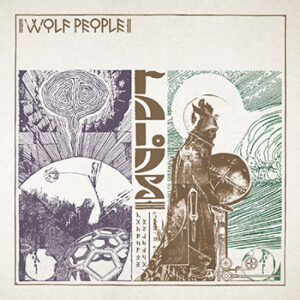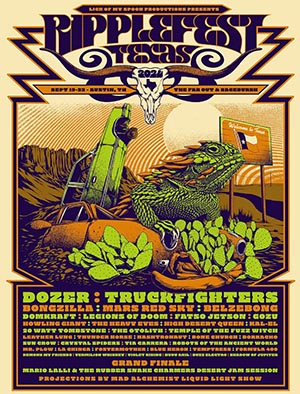 Those who consider Wolf People as following the British folk tradition only have a fraction of the picture. Perhaps it’s the nature imagery and themes that make them out to be folky hippies frolicking in the woods. But to be fair, on Ruins there is no frolicking, because there are no people. It’s more of a post-apocalyptic, post-human landscape where life goes on but some living things, but not all. What once might be considered exceptionally grim can all too easily be considered inevitable now.
Those who consider Wolf People as following the British folk tradition only have a fraction of the picture. Perhaps it’s the nature imagery and themes that make them out to be folky hippies frolicking in the woods. But to be fair, on Ruins there is no frolicking, because there are no people. It’s more of a post-apocalyptic, post-human landscape where life goes on but some living things, but not all. What once might be considered exceptionally grim can all too easily be considered inevitable now.
Growing up in Bedfordshire playing in bands during the Britpop era, Jack Sharp and Tom Watt sought to do something different by crate digging to assemble beats for a potential path in hip-hop production. They ended up enamored with the obscure British blues, folk, psych and proto-metal records they found, and began the path that lead to Wolf People. There are still moments throughout their third album where Watt’s drums sound like sampled hip-hop beats, such as on “Kingfisher Reprise” and at the end of “Belong.” The product of their explorations is a deep and wide variety of inspirations. Along with Pentangle and Fairport Convention, there’s a bit of Peter Green era Fleetwood Mac, Captain Beefheart, Comus, Jethro Tull, Wishbone Ash, Trees, Dark, Affinity, Black Sabbath, Scottish Sabbath-era proto-metal peers Iron Claw, and The Groundhogs, and band with a remarkable trajectory that started as one of the premier British blues bands in 1963 and ended up creating some radical hybrids of psych prog and proto-metal. Add in the post-psychedelic dual lead guitars of Television and contemporaries Dungen, you begin to get a better understanding of the three Wolf People albums, plus the scrappy compilation of early demos in Tidings. The dark, murky atmosphere also brings to mind my favorite R.E.M. album Fables Of The Reconstruction (1985), which was produced by Fairport’s Joe Boyd. They share some influences with fellow British psych proggers Syd Arthur, who are the main competition with Wolf People for my album of the year. But while Syd Arthur’s music has become lighter and more tuneful, Wolf People have gotten heavier with sharp corners and gnarled roots. They have moved from folk to a harder rocking sound.
The band also wears their literary influences on their sleeves to the point where they recruited novelist Ben Myers, who’s third novel Pig Iron (2012) was an inspiration during the making of of Ruins, to write the band’s press release bio. In Myers’ folky crime-noir, the English countryside, moors, dales and bogs plays an important role, as it does in 1973 horror movie The Wicker Man and Iain Banks’ dread and violence in The Wasp Factory (1984). I’ll be reading Myers’ new book Turning Blue, which looks like it will also mix well with Ruins, if you’re able to tune out the lyrics while reading like I do. But while lyrics are often a weak point for many bands, because let’s face it, no one besides Dylan (and possibly Leonard Cohen) will ever be up for any literary prizes ever again, Wolf People are at least a step above most their peers. The album opens with “Ninth Night,” which quotes from ancient folklore an incantation used by thieves seeking magical protection from the pickled hand of a hanged man installed with a candle made from human fat — “Oh Hand of Glory shed thy light, direct us to our spoils tonight.” Despite it’s release as a single on Halloween, “Night Witch” is not a spooky horror pastiche, but rather a powerful tale about the Nachthexen, the female Soviet aviators of the 588th Night Bomber Regiment who terrorized the Nazis in WW II. The Germans nicknamed them the “Night Witches” because their Polikarpov Po-2 biplanes would glide in idling toward the bomb release point, with only the sound of wind to give them away, sounding like broomsticks.
“Rhine Sagas,” “Thistles,” and “Kingfisher” are breathtaking evocations of nature’s vengeance, the music finely honed into an eerie, earthy, dark psychedelia that unifies brittle dueling guitars, synths, flutes and funky drums into a unique, modern signature sound that comedian Stewart Lee affectionately called “peat bog superfuzz sphagnum moss sludge.” Like Steeple (2010) and Fain (2013), Ruins is not easily digested in the first sitting. It’s like getting lost in the woods and overwhelmed by all the strange noises in the dark. It’s unsettling, but rewards repeated listenings by gradually unlocking its mysterious gifts, drawing us into a strange world that may be grim, but also alluring. Fans of Game Of Thrones, Stranger Things and the various Nordic Noir TV series would argue that the entertainment form of Television is an all-time artistic peak. Wolf People is about as close as you’re going to get to the musical equivalent in 2016.

March 29, 2024
Fester’s Lucky 13: 1994
March 11, 2024
Winter Rundown
January 4, 2024
Fester’s Lucky 13: 1989



